Text
Kaveh and Alhaitham, Sumeru Bulletin Board (over)Analysis: Part 2
(This is a reworked excerpt taken from my Haikaveh essay! If you're interested you can check it out here or as a pdf <3)
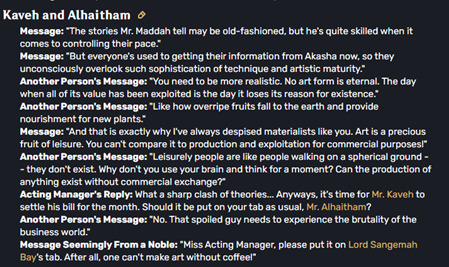
In Kaveh and Alhaitham's discourse on the discussion board of Puspa's Café, the two disagree over the subjective value of art. This topic is of particular significance to Kaveh, as it is a key element of his character design in respect of his career as an architect, being an artist himself, as well as it being highlighted within his Hangout. This is one of the few instances we receive of Alhaitham and Kaveh discussing the arts with each other to such an extent, so it is interesting to gauge Alhaitham's viewpoint.
Alhaitham holds a pragmatic view of art as a recourse, aligning it with any other material good to be produced, whereas Kaveh's viewpoint aligns with his sensibility, in that it is the meaning of art that trumps its material price and market demand. This makes sense considering their mirroring perspectives, in which Kaveh is described to be the opposing sensibility to Alhaitham's rationality, and in that human feeling is contrasted with practical knowledge.

The idea of correctness is alluded to here with the 'clash'ing of theories and Alhaitham refusing to pay for Kaveh's tab due to Kaveh disagreeing with his 'materialist' perspective. Since there is no definitive answer to their debate, there is no objective correct opinion offered. This idea of 'correctness' is a extremely relevant to Alhaitham and Kaveh's relationship, being a reason for their past argument and the misalignment of their once seemingly harmonised views, manifesting in their joint thesis of language and architecture. Now, however, the two are on differing wavelengths and appear to assert their opinions as the objective truth over the other (which is further discussed here). This ultimately acts as a detriment since Alhaitham asserts in A Parade of Providence that sometimes correctness can mean 'nothing at all'.
Not only is this particular board post interesting in regards to the differences in Kaveh and Alhaitham's characters and their approaches to life, it is also relevant in establishing their rapport with each other.
On a surface read, Alhaitham and Kaveh’s relationship can be simplified as “terrible” (as described by Geoff in A Toast To Victory), as in the two do not get along - but this in itself is a contradiction to Alhaitham’s inconvenience-avoiding nature, as by this he would gain nothing by allowing Kaveh to live with him.
Alongside their situation as roommates, it is revealed here that Alhaitham usually pays for Kaveh’s tab in Puspa’s Café, as well as buying crates of wine for the two of them from Lambad’s Tavern (as established in the Mahamata Bulletin Board). Whilst this is established, what is not established is what Alhaitham receives from these actions in return.
The implication is that Alhaitham does so without any expectations of reciprocation – as follows with his ‘rule’ of not keeping “track” of favours, so long as they do not inconvenience him. Alhaitham offering to buy Kaveh drinks in reference to a hypothetical furniture shopping excursion is referred to as a “loan” by Alhaitham, however, this does not mean that his paying off Kaveh’s tabs counts as the same.
When Alhaitham declines paying for Kaveh’s tab, it is because they have disagreed over their philosophies, and Alhaitham does so to ground Kaveh’s perceived idealism – referring to Kaveh as “spoiled”. Since Kaveh having to pay for his own tab is seen by Alhaitham as a sort of retribution, this shows that Kaveh typically does not have to pay Alhaitham back. This implies that the other “usual” instances of Alhaitham paying Kaveh’s tab are not loans, and are actions that are performed without expectation of reciprocation. Even within the proposed hypothetical scenario of Alhaitham buying drinks for Kaveh as a “loan” (as established in Alhaitham's story quest), he does not turn down Kaveh’s offer to go furniture shopping, and instead chastises Kaveh for pretending he is not in debt and having to live with Alhaitham.
These voluntary actions Alhaitham performs for Kaveh demonstrate the lack of inconvenience Kaveh imposes onto his life, and therefore rebuke the argument that Alhaitham actively dislikes Kaveh.
This discord of viewpoints and the lack of compromise demonstrated here as present within their two other bulletin board messages, albeit in different ways. The question ultimately posed ties in with the core question of their character design, most accurately put across in Kaveh’s Character Story 5, can their mirroring viewpoints ever align? Can they restore the harmony once established between them? Can the two ever understand each other?
#haikaveh#kavetham#alhaitham#kaveh#haikaveh meta#genshin meta#i think about the bulletin board messages too often#do you think the devs have forgotten about them? yes!! <3#this whole exchange just makes me think of nilou's story quest#and everyone called that guy lonely and touch starved#an incidental alhaitham parallel?? i think so!!
15 notes
·
View notes
Text
This is incredible?? I love reading your introspective into their respective messiness and their collective mess, you always highlight points that make me audibly gasp. There is so much to get into in the writing of their relationship so I thank you for illuminating particular nuances!!
Your thoughts are so amazingly put, I really don't have anything to say, so I've picked out a few quotes that encapsulate them:
"So when Egoism and Altruism are pitted against each other, it's just the choice to help the self against the choice to help someone else. Make others feel better by making their own life better / make oneself feel better by making the life of another better. Two sides of the same coin, really.
We can see it in how Alhaitham navigates the situation with Kaveh - how he prods at him; dances around topics and fights; how he pushes and pulls and jabs and waits for reactions to note down for future use and consideration. And when he oversteps, he backs away, creates distance, ceases his teasing, because he knows better. That is his go at altruism, putting his own comfort to the side to help another (even if it’s through an egoist lens).
And honestly? Kaveh might also know both of their ideals aren’t fine tuned yet either. He lives through the consequences of his own actions he orchestrated. If anybody knows the flaws of his ideals, it’s him first and foremost. But there are more blocks and obstacles in his way of becoming better, of tuning it to an actually usable means of living. And he knows that to actively pursue his ideals, he needs to learn how to reach his own individualism so he can be strong enough to be altruistic (so really, his egoism is still through the lens of altruism).
Both of them struggle with their pride - a scholar’s fatal flaw - and their joined character arc pretty much heads to them learning through each other to set it aside and embrace the reflection of their own ideal to actually make it a reality in a way that is worth striving for."
An amazing read, thank you so much for this <333
Hi, @iridescentmirrorsgenshin ! I'm finally putting my thoughts down about your doc, and I didn't anticipate this to come out of it (that's a lie, this is exactly what I predicted). I kinda got stuck on the section of Alhaitham's egoism and ended up with 1.8k words I'm not even sure make sense. I'm not even gonna apologize, this is a lot of fun.
But I wanted to genuinely thank you for ever writing it, it's nice to have all of your thoughts and observations to fall back on to, so I can pick my brain about something that makes me giddy.
This is less about a deeper reading on Alhaitham and Kaveh, or reinterpretation of what you wrote, and more of me going feral and adding what I call "supplemental thoughts". Or maybe it's all of the above, I'm not sure, someone else can be the judge of that.
Anyways.
The conflict between Alhaitham and Kaveh can be surmised at a glance as either: If Egoism is the ideal of living life by one's design and desires not decided by The Collective, then Altruism has to be the ideal where one has no decision about their own life until the lives of The Collective are thriving. Or it can also be: if Altruism is the ideal of living life by helping others live better to not overstep each other’s boundaries, then the Egoist has to turn a blind eye to the need of others and their passive life is contributing to everyone’s misery.
At least that is how it's usually pitted against each other from the perceived (and in many cases valid) opposition of ways of thinking. The Individual vs The Collective is an interesting way to divide people's needs after all.
Altruism in Kaveh’s case comes with a lot of baggage for him personally.
Financially, he got ruined and that struggle was an uphill battle ever since; we could even see it as a Sisyphus moment, where he pushes through his debt for financial freedom (trying to reach his own egoism), only to willingly jump down the hill to help others, ruining all his progress, and usually hurting himself in the process (even if that hurt is more on the psyche than physically).
Emotionally, it also can be complicated - he doesn't fear showing feelings, if it's in the scope of being loud or excited or openly frustrated; he blasts it all with no reserve, no shame. But he doesn't get angry, or sad, or upset. The only times anyone sees that side of him is if he's drinking, or he's too tired, or you're Alhaitham. He sees his own emotions as a heavy burden, and he doesn't want to share that weight, because of the bias that it's him. He can be miserable, because he can bear it just fine. But if someone else should do that with themselves, then that's a problem, and he has the need to help, because he knows how miserable it feels to deal with it alone. A self-imposed punishment.
But what is often times overlooked, is that Altruism in the end is a choice. People choose to do good, even on the expense of their own luxury, because of their own perceived morality and want to help.
Everyone has different reasons for being altruistic - some hate harm and cruelty in general, so they actively try to battle it, so it's not around them anymore; some lived through bad situations and want to save or help heal someone else going through it; some can see it as a self-esteem boost, because they got the skills and means to do good, so they have to be good too. It's not a cut-and-dry, one-size-fits-all type of ideal.
And yet, even if it's meant to be a positive outlook on life, a lifelong project to make the world better, if not for oneself, then someone else, it can be used as a self-harming action that would be frowned upon if someone tries to stop it.
"This person is in need, and you want me to stop? Are you really so cruel and selfish?" is a common enough excuse to push anyone questioning a person's negative altruism from ever trying to stick their nose into their method again, because The Collective usually only sees the deed and the positive result of the person helped, and not the detriment the helper acquired through their stunt. It's a very effective self-punishment if anything, especially if the person harbors so much resentment and guilt for themselves that they want to repent for their subjective sins and be absolved of the negativity (and yet, if someone has those thoughts and feelings for long enough, there is a hope in them that they never get absolved and can be punished forever, because that brings a different side of relief).
And we can easily assume that Kaveh, even with all good genuine intentions, uses his ideal for his detriment on purpose; well, maybe not 100% consciously and deliberately, but he could seek the emotional drop that his altruism gives him on a subconscious level. The fall is just as exhilarating as a high, the adrenaline will be the same in the end. It’s the aftermath that differs, and by then it’s too late to back out.
Alhaitham having the awareness that Altruism is not inherently bad just makes this discussion more tense. We can see he thinks helping people is the right thing. He doesn't have anything against the ideal itself, but he is now aware of the negative way the ideal can be practiced then when he was a student, never seeing the darker possibility.
Now he lives with somebody he cares about, and they don't care about themselves, actively chasing hurt and then refuse help they preach about and give out to others themselves. It's exhausting; it's terrifying; it's heartbreaking. And he did try to talk about it before, he tried to make Kaveh see the true nature of his Altruism. And how did it end? With a torn project paper, a name taken off on said project, long silence stretching over years, and now a rocky coexistence that has so much to talk things over, but pride and hurt doesn't allow it. Of course he would be harsh and critique it on every single turn he gets.
Alhaitham's individualism is something that always makes me pause from a writing standpoint.
Meanwhile he does a good job at following the key principles of it - he has his own house, his cushy job with a set time, his reading and own way of thinking. All of that makes him self-sufficient. He chose these things. He made them essential parts of his comfort and needs, and he refuses to compromise on their existence and their specific boundaries.
He doesn't want to be the Grand Sage, the position of Scribe fits perfectly withing the scope of the energy he is willing to spend. He doesn't need a bigger house, or lots of popular aesthetics, because he doesn't need that to feel comfortable. He doesn't waste time yapping about nothing with people he doesn't care about, he rather uses that time reading or talking to people he likes and values.
All of that is…almost perfect. It’s hard to pick it apart like Kaveh’s Altruism, because it’s almost as if we’re past Alhaitham’s realization and change for the better. There are things to pick on about how he does things, I suppose, but that is less to do with his ideals and more with how he acts, it stops being a narrative problem and more of a thing to nitpick at a personal taste.
About the misunderstanding about egoism and narcissism: From my observation, Egoism is commonly associated with Narcissism, mostly through the misconception about self-importance, and the limits between acting in self-benefit and in harming others.
Meanwhile individualistic ideals prefer to focus on the person themselves (their needs, their fulfillment not depending on someone else, their agency, their freedom of choice), it gets lumped into Narcissism, solely because that person thinks about themselves first.
Except people love to ignore that Narcissism is putting oneself above the rest and disregarding the needs and wellbeing of others, Egoism is more about someone taking care of themselves to the point where they are in a shape they could use for better things (e.g. if someone struggles with mental health, bringing them into a straining situation because it benefits others is foolish, as the person can break down, can be harmed, and then the situation and the people involved have more problems on their hands than before; but if the person focuses on getting better first, then they could go into the same straining situation, but coming out fine, because they have the capacity to endure it).
But even if Egoism can be a good ideal to follow, its negative practice can be a very ironic situation. If the individual is trying to pursue Egoism because they "wanna stick it to the man" and do all of that to go against the grain for the sake of going the opposite way, they lose their individualism and choice to have a life according to their beliefs and not The Collective. They still let the society dictate their life, but if they don't know yet how to exist for themselves, they believe crossing the road to walk the opposite direction of everyone else somehow sets them apart from the rest, and gives them full autonomy. It's almost a desperate placebo to not feel helpless and dependent. It also makes the understanding of choice an absolute mess, because they don't know what choice is and how it can look.
So when Egoism and Altruism are pitted against each other, it's just the choice to help the self against the choice to help someone else. Make others feel better by making their own life better / make oneself feel better by making the life of another better. Two sides of the same coin, really.
It's a mirror image. Mirrors don't show absolute opposites, it's the same object, but it can be from a different angle, a different medium, a different feeling. The mirror can be the surface of a still lake, the reflection in a tinted window, even a shadow in a sense is a reflection of something.
Alhaitham seems to be way ahead of knowing that both him and Kaveh aren’t a hundred percent right in how their ideals work right now. Both could use some improvements, rearrangements, reconsiderations, moving boundaries around for a more fulfilling answer that actually works and is not dictated what their teen selves tried to set into stone.
We can see it in how Alhaitham navigates the situation with Kaveh - how he prods at him; dances around topics and fights; how he pushes and pulls and jabs and waits for reactions to note down for future use and consideration. And when he oversteps, he backs away, creates distance, ceases his teasing, because he knows better. That is his go at altruism, putting his own comfort to the side to help another (even if it’s through an egoist lens).
And honestly? Kaveh might also know both of their ideals aren’t fine tuned yet either. He lives through the consequences of his own actions he orchestrated. If anybody knows the flaws of his ideals, it’s him first and foremost. But there are more blocks and obstacles in his way of becoming better, of tuning it to an actually usable means of living. And he knows that to actively pursue his ideals, he needs to learn how to reach his own individualism so he can be strong enough to be altruistic (so really, his egoism is still through the lens of altruism).
Both of them struggle with their pride - a scholar’s fatal flaw - and their joined character arc pretty much heads to them learning through each other to set it aside and embrace the reflection of their own ideal to actually make it a reality in a way that is worth striving for.
#haikaveh#kavetham#haikaveh meta#it all makes sense dw!! i shall now read it again and again <333#YOURE GOING TO DO MORE??? THATS AMAZING!???#i'm looking forward to anything else you can think of i know it's going to be an exhilarating read!
9 notes
·
View notes
Note
cyno story quest comes out in the next phase Sigh...another 30 days without kavetham
We’ve had to wait practically a YEAR for crumbs so this is a test of patience!! I believe in kavetham nation!!! (In my case i’m debating whether this is 30 days to wait or 30 days to recover from the leaks… ((it’s both)) <//////3)
#how do i say ive been looking at the screenshots and etching them into my brain#without saying ive been looking at the screenshots and etching them into my brain#haikaveh nation can do it folks we are well equipped to handling the waiting game#unfortunately#in the meantime my inbox and dms are open as usual and i plan on posting some things at some point!! <3333#haikaveh#kavetham
11 notes
·
View notes
Note
DID YOU SEE THE KVTHM DIALOGUE LEAKS…
ANON I HAVE AND I HAVENT BEEN OKAY SINCE. THIS IS EVERYTHING HAIKAVEH NATION HAS BEEN WAITING FOR. EVERYTHING IS ALIGNING. AND I DEFINITELY HAVE THOUGHTS. I THINK I SHALL WAIT UNTIL THE STORY QUEST COMES OUT SO EVERYTHING IS DEFINITIVE BUT KNOW I'M NOT OKAY!! I HOPE WE'RE ALL HOLDING UP <3333
#yeah theyve been on my mind all day#if anyone wants to talk about the leaks btw feel free to yell at me in my inbox or in dms <3333#cyno story quest leaks
0 notes
Note
I have all languages downloaded, but I switch to english when alhaitham and kaveh come up. all actors have different interpretations and it's all so interesting, alhaitham sounds near similar in all versions. japanese kaveh dub is more soft spoken, but it holds back his angrier/more intense lines. Korean ver kaveh is more deadpan, and chinese is here kaveh is the most jittery/ uptight in my opinion. In the english version kaveh is more passionate and alhaitham is a little more sarcastic but it definitely makes for the best banter , my favorite being the end of paradeofprov, that whole -thanks for letting me know all this- scene was near perfect delivery
oh that's really interesting that alhaitham sounds near similar in each dub? i really wish i could understand all the language so as to really grasp the different nuances hahaha yes i agree that EN kaveh is v passionate and i love that for him, it contrasts so nicely when he shows hesitance, especially when asking alhaitham if he's okay like in alhaitham's story quest, and then thanking him almost mutedly in a parade of providence, and when alhaitham questions him, he rises to it, and quite literally becomes the >:( emoji <3 their banter is honestly top tier, especially at the end of apop like the whole 'uh... wHAT' compared to other dubs where it's just 'what', like yes thank you for the flavour <33
#i'm so excited for the new voice lines i have been thinking about the deliveries#im so excited for more soft tones??#at least i can hope xx#thank you for your ask!! this is a really interesting topic since the characterisation can vary quite significantly depending on the dub!
3 notes
·
View notes
Text
i am on twitter now!! idk how to use it and it scares me but i would love for my timeline to be filled by genshin content, so if anyone has any recommendations as to haikaveh content creators or has their own account they'd like to share, please feel free to share them with me!! <333
#i've been thinking about using haikaveh twitter for some time#but twitter always overwhelms me so i've been putting it off#but if anyone has twitter i'd love to give you a follow!! idk who to follow over there :((#haikaveh#kavetham
4 notes
·
View notes
Note
I found your account I love your readings! Quick question, what language do you play in? I think different voice acting give the characters different vibes. I play Japanese, but I heard the English is really good and funny too.
ahh thank you so much!! i'm glad that you like them! <333
Ohh interesting!! i play the game with the English dub? I've heard clips of the original Chinese and also the Japanese dub and they both sound really good to me! i play in English, but then i watch certain scenes in Chinese and Japanese so I can get the intonations of how the other languages characterise certain characters - specifically Alhaitham and Kaveh! i think that the English dub can be a little,,, off sometimes? So it makes sense why characterisation can differ greatly depending on what language someone plays in. For example, I've seen that in Chinese, Kaveh apparently seems more cheerful or whimsical? or at least he fronts that way! Alhaitham in Chinese apparently is a lot more straightforward, whilst in English this can be interpreted as more snarky perhaps? Although, personally I really like the English voice acting, I can see why others don't!
on the other hand, i don't like how the translation text for whatever language the game is dubbed in is the same :( especially when the dub changes specific nuances or detail that the english misses - for example, alhaitham saying that kaveh is 'overly sensitive' in seemingly a negative manner in the EN when the actual nuance is that perhaps kaveh cares a bit too much for other people at his own expense? no matter what dub you pick, the english translation text remains the same so you have to look online for alternative translations
i'm excited to hear what the new dubs, Japanese and English alike, have in store for us in cyno's story quest 2!!! <3333
#thank you so much for this ask!!! it was interesting to consider!!#i'm so excited for the new voice lines!#i shall be listening religiously to all the voice lines in every dub!!
1 note
·
View note
Note
yes yes yes!!! the fact that they were so young when facing such opposing ideals for the first time is so ?? and they seem to have embraced it until conflict arose, and after that ugly confrontation they've been dancing around that hurt ever since
!! the fact that their viewpoints are ESSENTIAL to the other?? that alhaitham sees kaveh's views and his presence as perfecting his own perspective?? expanding his own view of the world?? now if only kaveh could process this!!!
also "And because he knows altruism is not inherently bad or stupid, then the problem of Kaveh's ideal is not the ideal, it's the approach, the execution, and the result on Kaveh's wellbeing that is the harm and stupidity he condemns" i mean that's it??? and the fact that kaveh ALSO knows that his methods of pursuing his ideals are flawed and that it isn't his ideals themselves.... guys can you please talk
I find it so interesting that kaveh always knew that he and alhaitham saw the world differently, but they were still best friends. In kaveh's notebook he wrote this about alhaitham, "Our views are contradictory, but it is through contradiction that more speculation and philosophy may be born." Only when alhaitham noticing kaveh was activity harmful lifestyle for himself with his mindset and called him out. I always thought they had their first argument from different philosophy, but it stemmed from kaveh activity harming his lifestyle WITH this mindset that alhaitham got concerned and confronted him
Hiya! Thank you so much for your ask!! <333
Kaveh's old sketchbook has a very special place in my heart <3 it's as you say!! initially he believes that he and alhaitham have views which align, but then comes to the realisation that they actually hold opposing views, however, instead of viewing that a negative, this is actually a benefit to their relationship, as it can lead to new points of discussion!
it's only after their approaches in dealing with other people come to the surface do problems arise in their friendship - as brought about by their collaboration with others during their thesis. kaveh exerts himself to help others whilst alhaitham maintains the view that this is a fruitless endeavour as this a short-term solution to the marked difference between those driven by hard work and those by natural ability. by kaveh denying his own capabilities in spreading himself thin for others, alhaitham deems this as harmful, as kaveh effectively denies his 'true self'.
their problems culminate in this criticism of each other's philosophies, whereas their friendship was strongest when they perceived the positives in the differences of their respective philosophies. kaveh asserts his altruism as correct over egoism, critiquing alhaitham's aversion in helping others, whereas alhaitham highlights the detriment of kaveh's altruism. it is particularly interesting to note here that the comment that makes kaveh revoke their friendship is not solely their differences in dealing with people, as their previous arguments had been about, rather, it is the source of kaveh's altruism. this is noticeably different from their other disagreements, as this is seen to be the first time alhaitham has made such a personal comment, given how kaveh reacts to it, feeling 'seen through'. it is this personal comment which causes kaveh to end their friendship, more so than their differing philosophies


in-game, alhaitham is aware that their true issues don't merely lie with their differing philosophies, and instead focusses on kaveh's detrimental altruism stemming from his guilt of the past. this can be seen in a parade of providence, in which he researches sachin in order to gain clarity and closure around kaveh's father's disappearance into the desert not directly being tied to kaveh
as seen within their conversation, alhaitham initiates the conversation for a personal reason - to tell kaveh of his findings, in an attempt to alleviate some of his guilt; to provide closure - whereas kaveh sees this interaction as a debate of philosophies, as in a potentiality for correctness over the other. alhaitham changes the subject when kaveh discusses, and insults, alhaitham's egoism, which directly leads back to his own personal interest, being that of sachin's involvement with kaveh's father's disappearance
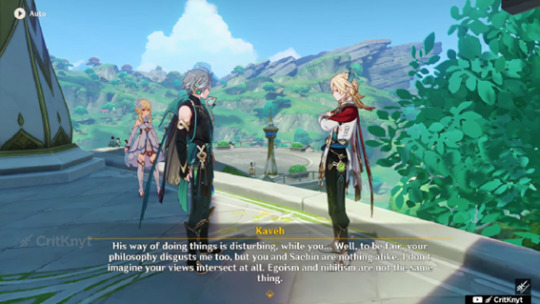



kaveh standing his ground in defence of his altruism prompts alhaitham to claim that their issue does not lie in correctness with the answer as to what, then, is their issue being subtextual - being provided in alhaitham seeking kaveh out for his personal interest over a scholarly debate
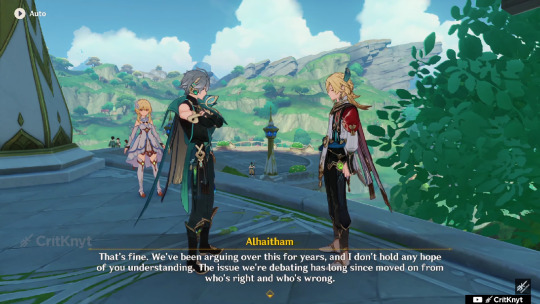
overall, i think it's pretty easy to simplify their relationship due to their opposing philosophies, but the fact they were best friends complicates this concept - yes, their approaches to life and dealing with other people are inherently different and acts as a point of contention between them, but in actuality i'd say that it's the concern behind this opposition of each other's way of life and the way this is miscommunicated to the other which appears to be the main issue
kaveh is a highly empathetic person and this empathy is further extorted by his own sense of guilt, therefore his altruism is excessive, detrimental even, and he denies his true capabilities by attempting to merge with the crowd - this is the issue that alhaitham has tried to express to kaveh, whereas kaveh sees this as a personal critique on his ideals and philosophy, and thus kaveh is rejected
alhaitham is a socially averted person who prioritises himself over others, actively denying himself the care and company of others due to this individualism - this is the issue kaveh has with alhaitham's egoism, whereas this comes across as asserting the correctness of collectivism as a philosophy over individualism, which denies alhaitham as an egoist, and thus alhaitham is rejected
i'd say the issue is balance - they must have achieved a harmony in the foundation of their friendship, so much so that they were best friends, they wanted to combine their 'opposing' fields of language and architecture to pursue a thesis project together. this balance was lost due to the idea of their being a correct way to live life, a correct philosophy, and this balance has yet to be retrieved.
ultimately, the two want the best for each other according to their own values, but with this comes acceptance. a level of understanding has to be realised once more before progress can be made, i think
This got super long but you raised a really intriguing point!! this has me thinking a lot about a parade of providence so i think i'll make a separate post on that!! <3333
#its always amazing to read your thoughts!! thank you!!#also??? 5?? times??? that's ??? im v happy to hear#i hope you enjoyed!!#i'd love to hear your thoughts whenever you can share!! <3333
23 notes
·
View notes
Note
Did u see the kaveh alhaitham dialogue leaks 👀 I was going to avoid them until.i found out cyno quest comes out in the next version sooo
anon you couldn't have asked me at a better time, i've JUST braved my fear and made a twt account and the first thing i lay EYES on are these soggy serene soft boys, i physically couldn't contain myself so YES i've seen the leaks, i am so excited to play cyno's story quest!! lore wise it looks interesting!! and i'm just so happy to be in sumeru and see all my favs again :')
but also i think i need to take 28 business days to process fresh haikaveh interactions just out the oven... i don't want to go into details for those avoiding the leaks but i'll definitely have things to talk about when the story quest is out!!! <33333
#HELP I DIDNT KNOW THE ACTUAL DIALOGUE WAS OUT??? IT JUMPSCARED ME!! I WAS SO USED TO SEEING ALHAITHAM: N/A#i think im gonna have to lie down for a week to be honest#THANK YOU FOR YOUR ASK!!! I NEEDED TO RANT ABOUT IT AFTER SEEING IT <3333#haikaveh#kavetham
10 notes
·
View notes
Note
I find it so interesting that kaveh always knew that he and alhaitham saw the world differently, but they were still best friends. In kaveh's notebook he wrote this about alhaitham, "Our views are contradictory, but it is through contradiction that more speculation and philosophy may be born." Only when alhaitham noticing kaveh was activity harmful lifestyle for himself with his mindset and called him out. I always thought they had their first argument from different philosophy, but it stemmed from kaveh activity harming his lifestyle WITH this mindset that alhaitham got concerned and confronted him
Hiya! Thank you so much for your ask!! <333
Kaveh's old sketchbook has a very special place in my heart <3 it's as you say!! initially he believes that he and alhaitham have views which align, but then comes to the realisation that they actually hold opposing views, however, instead of viewing that a negative, this is actually a benefit to their relationship, as it can lead to new points of discussion!
it's only after their approaches in dealing with other people come to the surface do problems arise in their friendship - as brought about by their collaboration with others during their thesis. kaveh exerts himself to help others whilst alhaitham maintains the view that this is a fruitless endeavour as this a short-term solution to the marked difference between those driven by hard work and those by natural ability. by kaveh denying his own capabilities in spreading himself thin for others, alhaitham deems this as harmful, as kaveh effectively denies his 'true self'.
their problems culminate in this criticism of each other's philosophies, whereas their friendship was strongest when they perceived the positives in the differences of their respective philosophies. kaveh asserts his altruism as correct over egoism, critiquing alhaitham's aversion in helping others, whereas alhaitham highlights the detriment of kaveh's altruism. it is particularly interesting to note here that the comment that makes kaveh revoke their friendship is not solely their differences in dealing with people, as their previous arguments had been about, rather, it is the source of kaveh's altruism. this is noticeably different from their other disagreements, as this is seen to be the first time alhaitham has made such a personal comment, given how kaveh reacts to it, feeling 'seen through'. it is this personal comment which causes kaveh to end their friendship, more so than their differing philosophies


in-game, alhaitham is aware that their true issues don't merely lie with their differing philosophies, and instead focusses on kaveh's detrimental altruism stemming from his guilt of the past. this can be seen in a parade of providence, in which he researches sachin in order to gain clarity and closure around kaveh's father's disappearance into the desert not directly being tied to kaveh
as seen within their conversation, alhaitham initiates the conversation for a personal reason - to tell kaveh of his findings, in an attempt to alleviate some of his guilt; to provide closure - whereas kaveh sees this interaction as a debate of philosophies, as in a potentiality for correctness over the other. alhaitham changes the subject when kaveh discusses, and insults, alhaitham's egoism, which directly leads back to his own personal interest, being that of sachin's involvement with kaveh's father's disappearance




kaveh standing his ground in defence of his altruism prompts alhaitham to claim that their issue does not lie in correctness with the answer as to what, then, is their issue being subtextual - being provided in alhaitham seeking kaveh out for his personal interest over a scholarly debate

overall, i think it's pretty easy to simplify their relationship due to their opposing philosophies, but the fact they were best friends complicates this concept - yes, their approaches to life and dealing with other people are inherently different and acts as a point of contention between them, but in actuality i'd say that it's the concern behind this opposition of each other's way of life and the way this is miscommunicated to the other which appears to be the main issue
kaveh is a highly empathetic person and this empathy is further extorted by his own sense of guilt, therefore his altruism is excessive, detrimental even, and he denies his true capabilities by attempting to merge with the crowd - this is the issue that alhaitham has tried to express to kaveh, whereas kaveh sees this as a personal critique on his ideals and philosophy, and thus kaveh is rejected
alhaitham is a socially averted person who prioritises himself over others, actively denying himself the care and company of others due to this individualism - this is the issue kaveh has with alhaitham's egoism, whereas this comes across as asserting the correctness of collectivism as a philosophy over individualism, which denies alhaitham as an egoist, and thus alhaitham is rejected
i'd say the issue is balance - they must have achieved a harmony in the foundation of their friendship, so much so that they were best friends, they wanted to combine their 'opposing' fields of language and architecture to pursue a thesis project together. this balance was lost due to the idea of their being a correct way to live life, a correct philosophy, and this balance has yet to be retrieved.
ultimately, the two want the best for each other according to their own values, but with this comes acceptance. a level of understanding has to be realised once more before progress can be made, i think
This got super long but you raised a really intriguing point!! this has me thinking a lot about a parade of providence so i think i'll make a separate post on that!! <3333
#haikaveh#kavetham#alhaitham#kaveh#genshin impact#genshin meta#haikaveh meta#thinking about how alhaitham and kaveh were best friends#and how these issues ONLY came to the surface (implied) when they had to work/interact with lots of other people#this implies that these two were so close to the point that when they were together#they were in their own world#alhaitham not joining any other joint project after this adheres to his individualism and how kaveh rejecting him negatively#impacted him but also it shows how close he and kaveh actually were for him to consider working on a project with someone#what a great day to not be okay <3333#okay but this was super fun!! thank you so much for your ask!!#basically they want the other to be happy#that's ultimately it#screaming at them tbh!!
23 notes
·
View notes
Note
do you have an analysis on Alhaitham and Kaveh having no family in sumeru, (haithams grandma, kavehs mother going to fontaine) so they only had eachother? So their falling out must have hit harder-
Hiya! Thank you so much for the ask!! <333
I have some analyses on Alhaitham and Kaveh being each other's home and family! There's quite a few so I'll be brief with the synopses here as I don't want to bombard you hahaha <3 I have discussed the idea of Alhaitham being the ideal companion/family for Kaveh in an analysis of Kaveh's 2023 birthday letter; the motif of 'home' and what it means for Kaveh and how Alhaitham factors into it; as well as in the relationship between Kaveh's mother and father and how this parallels with Alhaitham and Kaveh's relationship.
In terms of Alhaitham and Kaveh's argument, I've discussed Sumeru's concept of the academic family and how Alhaitham and Kaveh's argument served as the dissolution of their found family, as well as an analysis of their argument, specifically from Alhaitham's omitted perspective. I have also speculated life for the two post-fallout, mostly from Alhaitham's perspective as Kaveh (as usual) is more open in his character stories.
You've highlighted a really key aspect of their relationship which haunts me - they met each other after the respective loss of their own families. Kaveh just said goodbye to his mother as Alhaitham enrolled in the Akademiya, just after his own grandmother passed. This passage described in Kaveh's character story 5 describes this, and then him meeting Alhaitham within the same passage.
Kaveh is described to have 'wishful thinking' regarding his and Alhaitham's friendship, in that, where he initially believed that their views aligned, despite the reality they have differing approaches to life, this isn't inherently a negative thing, as it can lead to new philosophies. Kaveh didn't want to believe that their differences were impossible to surmount, and instead that they complimented each other. Perhaps Alhaitham thought so too? They both agreed to work on a joint thesis together, with this conveying the implications of forming an academic family in Sumeru, with Kaveh trusting Alhaitham in picking a topic that highlighted both of their strengths - which ended up being a project revolving around language and architecture; two subjects which Kaveh now believes to exist on opposite sides of the mirror. Initially, this was to demonstrate the good that could come from balancing these seemingly opposing fields.
Although, it would inevitably come to be that problems arose between them when the differences in their philosophies became a point of contention. The two's previous harmony became misaligned when the assertion that their respective viewpoint was 'correct' over the other. When Kaveh tears up the thesis, he effectively ends the relationship he and Alhaitham built together, as well as the prospect of their found family. Alhaitham, in turn, removed his name from the thesis due to Kaveh's ending of their friendship.
After this, Kaveh graduated and threw himself into work, chasing his ideals, effectively distracting himself - both from the loss of Alhaitham, therefore his loneliness, and from the potential truth that Alhaitham revealed to him about his guilt being the cause of his incessant altruism. Contrarily, Alhaitham's life after this point is devoid of detail, only that he became the Scribe and moved out of his grandmother's house into the property that the Akademiya gifted him and Kaveh for the progress of their abandoned project.
Kaveh describes meeting Alhaitham as one of the most pivotal moments in his life in his hangout, and in A Parade of Providence, he describes their meeting as when his life began to go downhill - indicating, rather, to the consequences of their inevitable falling out. Alhaitham considers Kaveh as one of his priorities in maintaining the way of life he seeks to maintain, and although he is more reticent than Kaveh, in that his inner thoughts are concealed from the player, an instance that stands out to me that their argument personally affected Alhaitham comes from A Parade of Providence. This is when Alhaitham comments on the contradiction of Kaveh's motives, in that he expresses he has bad luck but insists on drawing lots, despite the fact that Faruzan offers to split the points between them. After commenting on this, Kaveh displays genuine frustration with him - to which Alhaitham backs down and switches tact. This is especially prevalent within the EN dub, where Alhaitham stutters before changing topics.
To me this underlines that Alhaitham was just as affected at by their argument as Kaveh was. Especially since this exchange can mirror the very exchange that caused the rift between them - in that Alhaitham points out Kaveh's self-destructive habits and it is perceived as a malicious critique. Alhaitham backs down when seeing that Kaveh is genuinely hurt because he doesn't want to repeat the past - he doesn't want to hurt Kaveh and lose him once more.
This is also encapsulated in the fact that Alhaitham sees Kaveh as his mirror, in that they both have a lack of familial connections. When Alhaitham believes that the presence of another genius can 'perfect' his vision, this isn't just a reference to Kaveh's differing perspectives, this also offers Kaveh as a familial figure to Alhaitham - in that, Alhaitham views Kaveh as his family. Similarly, Kaveh seems to hold an idea that he and Alhaitham are bound by fate, or 'the universe', meaning that he identifies Alhaitham as being essential to him in someway, however, as of now, he struggles with this being a benefit, rather than a negative.
I hope this answers your ask!!? You've unzipped me and all the haikaveh found family brainrot is pouring out <3333
#haikaveh#kavetham#alhaitham#kaveh#haikaveh meta#genshin meta#kavehtham#genshin impact#i think i rambled!! i repeated points that i've made in the posts i tagged but i thought i should summarise my overall thoughts#in case it was helpful? i tagged an awful lot of posts so just read the ones that most appeal to you!!#this was very fun (and by that i mean painful) to consider#family is so interwoven into both of their character stories that its almost ridiculous like we get it hoyo#alhaitham considers kaveh to be his family (implied) (but also canon)#and kaveh views alhaitham as his 'home' but is in denial (implied) (but also canon)#also i know that i talked a lot about their life after the argument but there is such a lack of detail on both ends about what happened#immediately following that#like kaveh was not graduating yet meaning that they would have likely seen each other within the akademiya#and they would have had to act indifferent to each other#kaveh would have put on his front he used around everyone else and alhaitham would have continued viewing everything objectively#but they were both deeply affected#and then alhaitham has the gall in kavehs hangout to say 'there was nothing embarrassing or shameful about it' as in their argument as if h#didnt lose his chosen found family and had chosen to rebuild this bond in the future since kaveh was still so intrinsic to him#HES EMBARRASSING!!#thank you for the ask!!!
21 notes
·
View notes
Note
I love all of your analysis of these two losers ❤️ I have yet to read the full essay (soon! I just need time) but have you done a part on this NPC who talks about (supposedly alhaitham) a big guy buying crates of wine and muttering something about it being enough for an apology?
I can't remember exactly where but it was a merchant in either sumeru city or port ormos. I'm leaning on the city and possibly in the inner market near the theatre. I'll try looking tomorrow and send you another ask
Hiya! Thank you so much for your ask! I’m so glad to hear you’re enjoying the haikaveh brainrot hehe, we’re all in the basement together! <3
I know the one you’re referring to! This should be it, it’s from a vendor in the Grand Bazaar:

I didn’t mention this in the essay because of it being speculatory, but I’m more than ready to speculate here. I agree, this is most likely an inference to Alhaitham, not only considering his status as a Mahamata but also due to the fact that it’s an integral part of Alhaitham’s character that he prefers to be unknown. Even when he serves as the Acting Grand Sage, people don’t typically recognise him due to how little known he is despite his primary role as the Grand Scribe, as seen in his story quest. This would align with why the vendor admittedly has no idea who this particular customer was.
Drinking, particularly wine, can also relate to both Kaveh and Alhaitham, as this is an activity they both partake in together. Alhaitham’s voice-lines express that he likes to have a drink after work, along with his demo showing him drinking wine with Kaveh, Cyno and Tighnari, and him apparently stealing Kaveh’s beer in A Parade of Providence. Similarly, Kaveh also states his preference for drinking in his voice-lines, as well as his overindulgence in this hobby being highlighted in his hangout. Additionally, the furniture item ‘Monthly Frustration Be-Gone’ references Kaveh buying expired wine in order to get a discount.
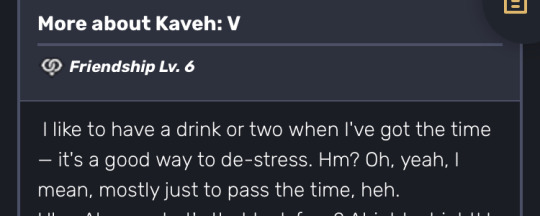
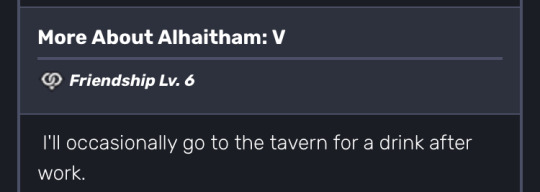
Since this is an NPC conversation, it’s also worth noting other external worldbuilding details, such as the bulletin boards of Sumeru. In the three exchanges Alhaitham and Kaveh have, all of them reference drinking in some way, in that Alhaitham typically indulges Kaveh by paying for his tabs – revoking this only when they have a disagreement. Lambad also notes that Alhaitham and Kaveh go drinking together, as well as Kaveh picking up wine ordered by Alhaitham.


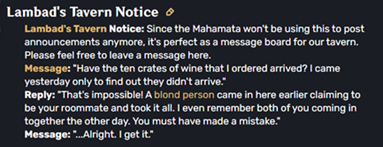
Alhaitham buying wine for Kaveh to make up for some disagreement between the two aligns with all these established details. When considering the typical exchange of Alhaitham refusing to pay for Kaveh’s drinks when Kaveh disagrees with Alhaitham’s views, it makes sense that it would also work in reverse – as in, when Alhaitham trespasses on Kaveh’s views which leads to Kaveh’s upset, Alhaitham would buy him drinks to make up for it
Alongside this, character description wise, there is no other convincing contender as to who else this could be? Alhaitham uses the tall male model, and is the only tall, relevant member of the Mahamata that the player is aware of.
Given all these context clues the game gives us, I’d say, yeah, this is our resident loser Alhaitham!!
If I’m honest I think about this dialogue a lot :DDD so thank you for giving me an excuse to talk about it hehehe I hope you enjoy the essay when you find the time :’) <3
#haikaveh#kavetham#alhaitham#kaveh#haikaveh meta#genshin meta#also im just clocking that they say they like drinking in number 5 of their more about voice lines i hate them#we GET IT!! YOU GUYS HANG OUT ALL THE TIME#you guys are comfortable with each other!! alhaitham steals your beer and takes sips of your wine!!!#alhaitham pays for your tabs when he clearly doesnt have to do that!! he buys you a whole crate of wine when you dont want to talk to him!!#this has turned into me yelling at kaveh#like baby boy wake up pls <333#yeah no thank you for this ask i love this lil dialogue so much its such a <3 detail!!
13 notes
·
View notes
Text
Kaveh and Alhaitham, Sumeru Bulletin Board (over)Analysis: Part 1
(This is a reworked excerpt taken from my Haikaveh essay! If you're interested you can check it out here or as a pdf <3)
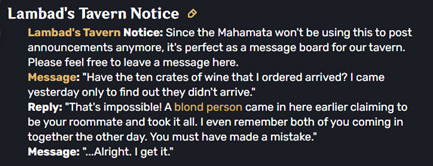
‘Lambad’s Tavern Notice’ posted on the Mahamata Bulletin Board tells of Alhaitham asking Lambad whether his order of wine had been processed. Lambad responds by saying that it had already been picked up by a “blond” person who claimed to be Alhaitham’s roommate, and that Alhaitham should already know this since the two frequented the tavern together “the other day”. This notice serves as foreshadowing of Kaveh’s status as Alhaitham’s housemate, although it is interesting what it implies in regard to their relationship.
Besides the information conveyed that Kaveh and Alhaitham drink together at the tavern (establishing a mutual regard for the other), the motif of communication, primarily miscommunication, can be observed here.
Kaveh and Alhaitham are operating on different levels of communication, and thus, they have missed each other. Rather than Kaveh informing Alhaitham upfront about him picking up the order, Alhaitham has to pursue other means of gaining this information, where Kaveh’s meaning is to be inferred, rather than directly supplied. Regarding their typical manner of dialogue, this aligns with their problem regarding miscommunication, in which true intent of words is concealed, and therefore unheard by the other, and misconstrued into a different perceived meaning (this is further discussed here).
The two are on unequal footing, displayed here by the concealment of truth, resulting in miscommunication, or a chance of successful communication.
The Bulletin Board messages serve as a representation of the standing of Alhaitham and Kaveh’s relationship and the discord between them which needs to be surmounted. This is exhibited within this bulletin board in the two ‘missing’ each other, in regard to Kaveh picking up the wine from Lambard’s Tavern without Alhaitham’s knowledge, and Alhaitham only finding out afterwards. The two fail to intersect in their communication; they are never fully understood in their meaning.
#haikaveh#kavetham#alhaitham#kaveh#haikaveh meta#genshin meta#like we get it theyre roommates they live together#kaveh takes liberties theyre comfortable with each other#but can they hold a conversation??#NO!! <3 i wanna bang their heads together#thank you for these bulletin posts devs even though you probably dont remember writing them in!! ill remember them for you
22 notes
·
View notes
Text
ahhh this is amazing, I didn’t know where to search! Thank you so much for your help! <3
does anyone know the author of The Haikaveh Google Doc? I would love to give them credit for the inspiration and help that the doc gave me for the essay!!
42 notes
·
View notes
Text
Alhaitham and Kaveh - not 'friends' but 'roommates'
(This is a reworked excerpt taken from my Haikaveh essay! If you're interested you can check it out here or as a pdf <3)
Due to Chinese game restrictions, explicit mentions of homosexuality or overt queer references have resulted in less implicit ways of conveying queer relationships or characters. Therefore, same-sex characters in romantic relationships are assigned the platonic status of “best friend” or “friends”.
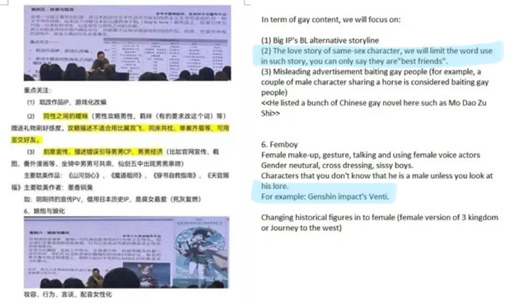
As such, these restrictions can be used as guidelines in establishing queercoding within Genshin Impact. It is of note, however, that this rule does not mean that all characters who are canonically “friends” are in a romantic same-sex relationship. Differentiating between same-sex couples and platonic friends (who have all been assigned the label ‘friends’) can be done by identifying particular care undertaken to ‘style’ characters. This is done so by queercoding, as in, using taboos linked to queerness; references which point to romantic connotation; or omitting certain details which casts obscurity on the nature of their ‘friendship’.
Alhaitham and Kaveh’s relationship has been styled in this way, as although various titles have been given to their relationship status, there has been no definitive term supplied overall. Alhaitham tells the Traveller that the two are “roommates”, with Kaveh confirming this, although stating that they “used to be friend(s), but not anymore”.
Within Kaveh’s Character Stories, their history as “best friends” is a painful one of separation, which can be seen as akin to a break-up, and despite their lack of status as ‘friends’, the two share an intimate knowledge of the other that no other character is privy too.

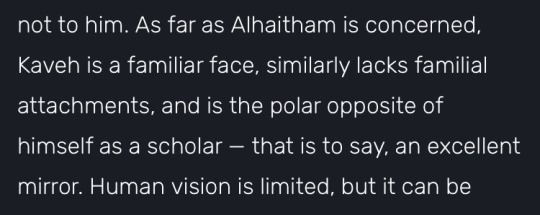
Condensing their relationship down to ‘roommates’ is an oversimplification that the narrative challenges the player to question.
This is achieved through their rapport with each other, seen within Alhaitham purposefully goading Kaveh, something which he cannot be seen to do persistently with any other character, as well as Kaveh’s unique reactions to Alhaitham, which present a side to him unlike which can be observed in his interactions with others. Additionally, the two mention the other without them present, as Alhaitham mentions Kaveh unprompted twice within the Archon Quest and once within his Story Quest, and Kaveh is prone to discussing Alhaitham with those who are aware of them living together, as Collei observes: “Seems like you always include him in the conversation, even when he isn’t here…”
When the two confirm themselves to be roommates, this is immediately followed by Paimon asking Kaveh if they are friends, to which Kaveh does not give a definitive answer too. When Paimon asks Alhaitham the same question in the Archon Quest, Alhaitham evades the question, and turns it back on Paimon, who notes that “[she] doesn’t know. That’s why [she’s] asking,” to which Alhaitham then describes Kaveh as his roommate. Although, this still is an evasion of Paimon’s initial question, Alhaitham neither denies nor confirms their friendship status. The status of their relationship is constantly called into question, for the characters they interact with, and for the player.
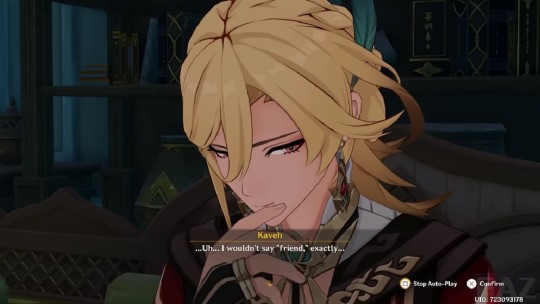
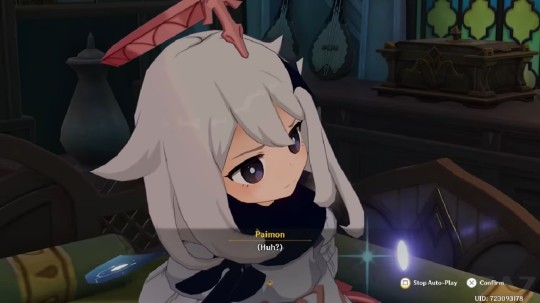

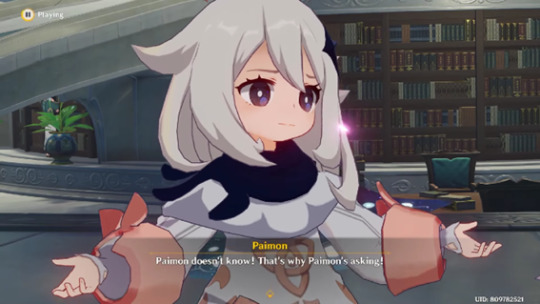
This casts an ambiguity over their relationship which aligns with Chinese gaming regulations in regard to same-sex couples, which in turn, points to a certain ‘styling’ of relationship which differs from general platonic friendships within the game. Where both platonic friendships and same-sex relationships can only be openly dubbed as ‘friendship’, signifiers must be present in order to differentiate these platonic friendships from the non-platonic.
Obscurity of relationship status can be used to do so – where characters are not explicitly “friends”, but are evidently tied to each other in some way, more than their assigned platonic status. Here, Kaveh and Alhaitham are irrevocably connected beyond their “roommate” status, and although they are not currently described as “friends”, they used to be, “best friends” according to Kaveh’s Character Stories, which creates a gap for interpretation.
The player is encouraged to interpret the reason for the two’s parting of ways, along with the reason for their current rapport. Although Kaveh asserts that there is a mutual “disdain” between the two, Kaveh observably talks about Alhaitham enough for Tighnari to assert: “No dinner with Kaveh is complete without a few words about Alhaitham." Rather than out of disdain, it can be surmised that Kaveh talks about Alhaitham due to the fact that he cares, as he states that the reason he has so many troubles regarding his work is because he cares so much about it.
When paralleled with his troubles with Alhaitham, being that Alhaitham finds a way to “infuriate” him every time they talk, it can be inferred that Kaveh’s approach to dealing with his work is the same as to how he deals with Alhaitham.
If Kaveh’s assertation that the “disdain” between the two of them was true, then there is no basis for him to talk about Alhaitham as much as he does. This is due to his attitude in caring about something results in him verbally expounding the problem, the same behaviour he exhibits when dealing with Alhaitham. By his own reasoning, if Kaveh did not care about Alhaitham, he would not be so “infuriate[d]” by his words.
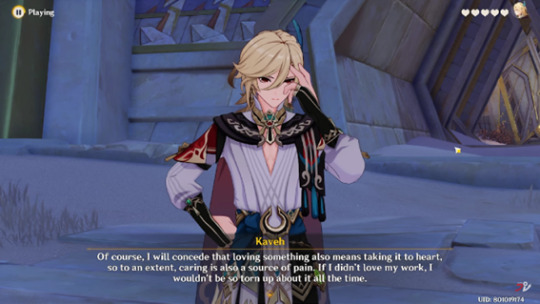
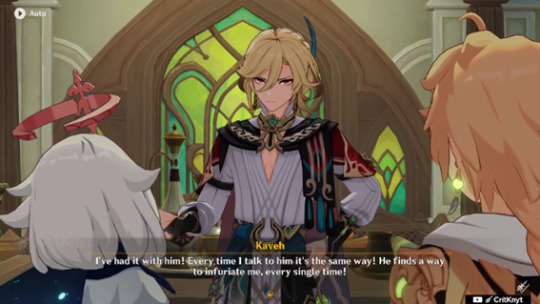
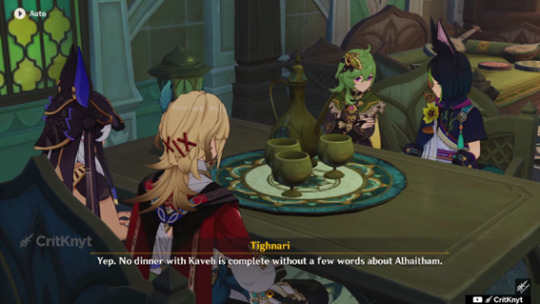
In turn, the player can see Alhaitham’s care of Kaveh manifest in his concern for Kaveh’s wellbeing within A Parade of Providence. In this sense, the rapport the two have currently which the narrative prompts the player to question can be explained. The two hold a mutual concern and care for the other, but due to elements in their past, they cannot address this, and thus it goes unspoken. The same can be said about the explicit status of their relationship, as no canon label applied to the two can truly explain their relationship, with ‘roommates’ being a clear oversimplification of their bond, and always followed up with the question of their friendship.
Alhaitham and Kaveh’s status as ‘friends’ is disrupted, not only due to the canon ending of their friendship in the past, but also in the current narrative of the game due to this refused label. Alhaitham and Kaveh do not adhere to the status of ‘friends’, either evading it (Alhaitham) or outright denying it (Kaveh), however, their bond remains central to each of their respective narratives, so much so that their differing viewpoints are integral to the other.
Alhaitham and Kaveh have been designed so that they are integral to each other, and the obscurity of their relationship acts as a signifier that their bond is not of a typical platonic friendship.
In Chinese gaming restrictions regulating platonic bonds and romantic bonds between same-sex characters as strictly ‘friendship’, Genshin Impact can be seen to subvert this in order to queercode. By creating an obscure bond between a same-sex relationship, a bond which the game constantly calls into question, a silence has been generated as to what the status of the relationship really is. The depth to Alhaitham and Kaveh’s relationship and the unspoken nature of it alludes to the queer taboo, in that its inability to be definitively labelled generates an otherness than that of an easily understood platonic bond.
#haikaveh#kavetham#alhaitham#kaveh#haikaveh meta#genshin meta#how have i just properly clocked that the library scene and kaveh saying the thing about caring are in the SAME hangout ending#i feel like im chewing on sawdust#i am wringing out every instance of heavy traces of homosexuality in the writing of these two#they make me crazy insane#they are deliberately avoiding labels#theyre not friends or roommates theyre a secret third thing#homosexual - but you didnt hear this from me!!#also im gonna be posting about a parade of providence at some point#because it owns my being#its one of my fav parts from the essay hehehe
68 notes
·
View notes
Text
An analysis of Kaveh and Alhaitham's argument - Alhaitham's omitted POV
(This is a reworked excerpt taken from my Haikaveh essay! If you're interested you can check it out here or as a pdf <3)
The only time Alhaitham and Kaveh's argument is mentioned in-game dialogue is during Kaveh’s Hangout. Due to Kaveh’s reluctance to discuss it with the Traveler at risk of tarnishing his junior's reputation, Alhaitham asserts that the argument is nothing to be embarrassed about, and that their differences in personality resulted in them being unable to work together. This rendition of the argument, too, is devoid of the detail which Kaveh provides in his character stories.

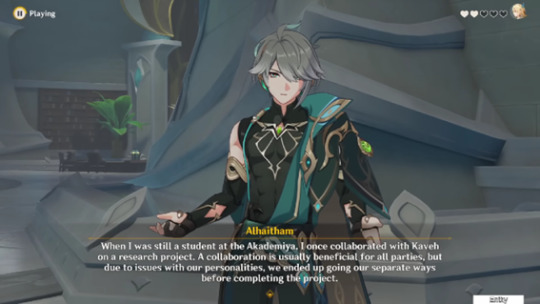
Due to this, Alhaitham’s perspective of the argument has been omitted to the player, and thus Kaveh’s perspective is the only fully developed account provided. In this, Kaveh’s perspective, and his interpretation, of the argument can be easily sided with as the player. In this case, it is clear how Kaveh was hurt by Alhaitham’s words, but not so clear that Alhaitham was, in turn, hurt by Kaveh. Additionally, the intention in Alhaitham’s words is omitted, and therefore is seen purely as weaponizing Kaveh’s guilt.
Since Alhaitham’s perspective of the argument has been omitted, what is included in his Character Stories in reference to his thoughts on the consequences of collectivism will be used here in order to establish the intentions behind the weaponisation of Kaveh’s guilt.
Alhaitham’s Character Stories pre-date Kaveh’s, but were written to establish his perspective of individualism in reference to those with natural talent and those without. These discussions are inextricably tied with Kaveh’s Character Stories and serve as Alhaitham’s explanation for the root issue of their argument.
Whilst Alhaitham’s Character Stories retain the positives of individualism, as in living apart from a general majority, they particularly highlight the detriment of those with talent forsaking themselves to “blend in,” and compromise their own development for the sake of the majority: “to leave the right of judgment in others' hands is equal to denying oneself”.
According to Alhaitham, letting one’s talents be dictated and judged by society can only serve as detriment to oneself – this is a direct reference to Kaveh, paralleling his Character Story in which he fears separation from the majority.
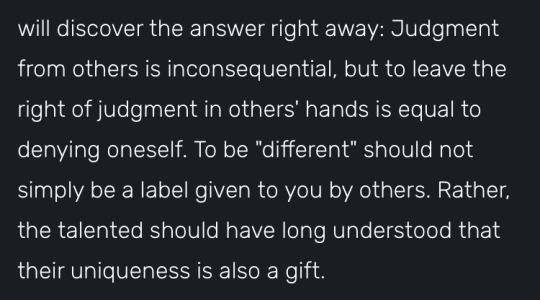

In this sense, Alhaitham’s usage of Kaveh’s “inescapable” guilt as the reason for his altruism serves as the grounding for Kaveh’s escapism, so as for Kaveh to reflect on the blame he places on himself and for him to alter his methods of self-sacrifice for the sake of others. This would then allow Kaveh to prioritise himself, in order to fully realise himself, since, as of now, Alhaitham considers the altruist as self-denying (which is discussed further here).
The concern in Alhaitham’s words can be pinpointed in the potential consequences of Kaveh exerting himself for others: “Kaveh's impractical idealism… would come to be a burden on his existence someday”. However, due to the stated “explosive” magnitude of the argument and his phrasing, this intention is missed by Kaveh, and is instead interpreted as a malicious critique of Kaveh’s character.

The core reason for the rift in Alhaitham and Kaveh’s relationship is not their opposing viewpoints, as actually, these conflicting perspectives are the cause for the solidification of their friendship, as seen in Kaveh’s Old Sketchbook.

Rather, it is the belief that their held respective viewpoint is correct, therefore proving the other’s perspective incorrect. It is the disrupted unity of differing ideals by asserting a supposed ‘correct’ viewpoint onto the other.
As established in discussion of Alhaitham’s view on talent, a label has been placed on Alhaitham and therefore others set themselves apart from him. Unlike Kaveh, however, Alhaitham does nothing to disprove the conceptions formed of his character, as they ultimately do not inconvenience him, as he desires to live apart from those who would place certain expectations upon him.
Kaveh instigates a friendship between them by overlooking these assumptions, initially approaching Alhaitham due to a belief that he was being bullied, due to sitting apart from people in his darshan. It is stated in Kaveh’s Character Stories that Alhaitham was his “best friend”, insinuating that Kaveh did not solely consider Alhaitham as such, but that it was an understandably mutual sentiment. As observed, whilst Alhaitham does not necessarily seek out social contact or actively form deep connections, his friendship with Kaveh shows that he is not averse to doing so, so long as preconceptions are overlooked and a true understanding is developed.
Therefore, Kaveh’s words that instigated the split of their friendship that: “[Alhaitham] could be much better welcomed amongst people if he would just care…” revokes and criticises Alhaitham’s core principles; those same principles which Kaveh had previously interpreted as a positive opposition to his altruism, as seen within Kaveh's Old Sketchbook.
Rather than respecting Alhaitham’s outlook on life, Kaveh asserts his own over Alhaitham, which Alhaitham responds to in kind, by asserting his egoism over Kaveh. When Kaveh then states that Alhaitham is “too” intelligent, he uses the preconceptions that other scholars had used against Alhaitham. This not only reinforces that others were correct in their avoidance of Alhaitham, but also diminishes their friendship entirely, as he dons these misconceptions as a way to strike back against Alhaitham.
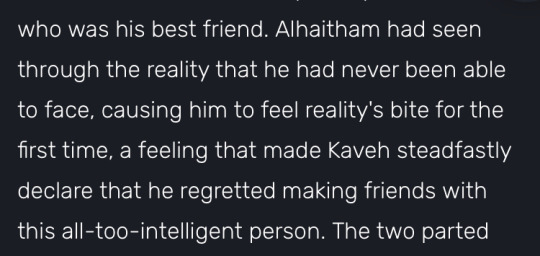
Along with stating his regret that he ever befriended Alhaitham, it is Kaveh’s weaponizing the general majority’s perspective of Alhaitham that effectively ends their friendship. By forsaking his own intimate understanding of Alhaitham, Kaveh alienates himself from Alhaitham. He does so by reinterpreting Alhaitham through the view of the general majority - the collective which Alhaitham believes denies Kaveh from finding his true self.
In this, the two are now disparate, as Kaveh holds Alhaitham in the same position as the general majority; in a position of distrust and wariness, despite recognising his talents. Whereas Alhaitham sees through the “front” that Kaveh dons for the majority and as such, has been denied trust on Kaveh’s end.
#haikaveh#kavetham#alhaitham#kaveh#haikaveh meta#genshin meta#thank you hoyoverse once again for alhaitham and kaveh's character stories#i still cant believe a parade of providence happened#holding it tenderly and violently to my chest#what do you mean the issue we're debating has long since moved on from who's wrong and who's right#then what is it all about alhaitham...#let me scratch my head and think real hard xx
67 notes
·
View notes
Text
Alhaitham and Kaveh as each other's 'home'
(This is a reworked excerpt taken from my Haikaveh essay! If you're interested you can check it out here or as a pdf <3)
Family is an important theme, particularly in regard to Kaveh, as the reason for his guilt is based upon his belief that he destroyed his own family. For Kaveh, family – home – is a place in which “words [are] not necessary” since companionship is valued above all:

Family is also important for Alhaitham, however, as there is a particular focus on the relationship between him and his late grandmother within his character stories, as her influence over him incentivised him to pursue the “peaceful” way of life he seeks to maintain:

After the death of his grandmother, Alhaitham lived alone and attended the Akademiya, just as Kaveh did as his mother left for Fontaine after his enrolment. Kaveh’s loss of family leads directly into him meeting Alhaitham. This establishes a direct correlation between Alhaitham and family, indicating that Alhaitham filled a role recently lacking in Kaveh’s life. This is relevant to Alhaitham, as he had enrolled in the Akademiya after the passing of his grandmother, meaning that, similar to Kaveh, he, too, had no family.
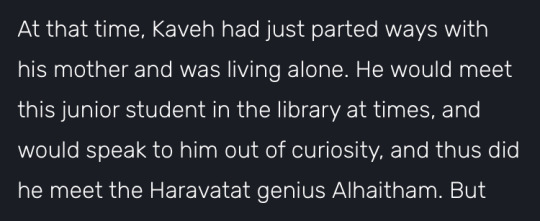
The idea of found family, as in, a tightly knit support network built with mutual sentiment between unrelated people, is introduced in Sumeru as the joint-thesis. Academic family is highly valued amongst scholars and comes into fruition through the working together on projects. This can be observed within the dynamic between Tighnari, Cyno, and Collei, as during the Windblume event, they describe themselves as a family formed outside of academia, even assigning themselves titles akin to a real biological family.
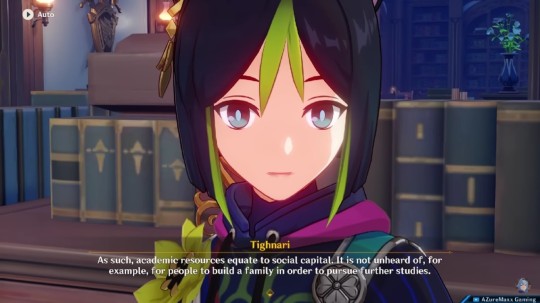

Alhaitham and Kaveh then established this found family in each other upon working together on a joint thesis, although additional scholars initially worked with them before dropping out. Their argument culminated in Kaveh ripping up their thesis, which effectively ended their friendship, and familial bond, made mutual by Alhaitham removing his name from the project. Kaveh, however, is described to have pieced the thesis cover back together with “deep regret”, and placed it in his old sketchbook.
In this, Kaveh regrets the loss of his connection with Alhaitham, and the family that their joint thesis established. Although he has pieced together the thesis cover, their family remains severed as reconciliation is perceived as implausible due to their differences:
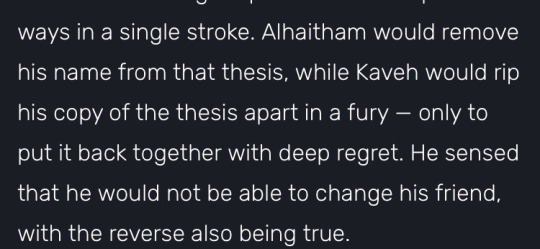
Most notably, it is the building which serves as Alhaitham’s house which is crucial to the motif of home. Due to their combined efforts in their joint thesis, the Akademiya gifted the two a research centre, as the results of their thesis had significant impact despite not being completed. When Alhaitham took up the property after graduation, he heard through a third-party, sent by Kaveh, that Kaveh was relinquishing rights of the property due to him not being in need of a house. It was after this that Alhaitham invested in the property, converting it into a house, where he took up residence, and then invited Kaveh to live with him, after the two met in the tavern. Although it is understood to be Alhaitham’s property, since Kaveh relinquished his right to it, Alhaitham considers Kaveh to be his “roommate” rather than a tenant, despite Kaveh paying rent.
Kaveh and Alhaitham split the chores according to Alhaitham’s Character Story, although they mostly fall to Kaveh; they both make attempts to decorate the house; presumably they eat dinner together, according to Alhaitham’s Story Quest where he excuses himself in order to have dinner, only to talk to Kaveh; the two can be seen to share a study; when ordering out, Kaveh orders extra for Alhaitham – a common enough occurrence for Alhaitham to be confident in relying on this. Rather than “cold” and “lonely” this conjures the image of warmth and familiarity. In this, it can be inferred that the two have created a home together.
Referring back to Kaveh’s understanding of “home”, as in a place in which words are not necessary, and linking it to the idea of companionship being more important than understanding introduced in his hangout. The latter idea consists of supporting a person, regardless of the ability to empathise with and relate to their particular struggles, should be valued over attempting to be wholly understood by people who are not willing to listen.
In this, Alhaitham is offered as a companion to Kaveh, where he cannot empathise with Kaveh’s artistic and idealistic struggles, but he is willing to listen to him, rather than offering words which cannot solve Kaveh’s particular problems.



By Kaveh’s understanding of “home” as a place in which people are at ease with each other and support another regardless, this can be seen within his relationship with Alhaitham. As Kaveh has pieced together their ripped up thesis cover with “deep regret” of what it symbolises, the severance of his and Alhaitham’s relationship, Alhaitham inviting Kaveh to live with him serves as mirroring actions of reconciliation.
Kaveh's idea of 'home' in encapsulated in both the building and the company Alhaitham provides. The building that had initially served as a physical representation of their severed harmony of ideals, aborted friendship and dissolved found family, has been transformed into a house, and now a home for the two to share.
#haikaveh#kavetham#alhaitham#kaveh#haikaveh meta#im never getting over kaveh's hangout#a parade of providence is kaveh's story quest yep yes i said what i said#companionship over understanding is alhaitham's 'the issue we're debating has long since moved on from who's right or who's wrong'#but their home being formed from their aborted thesis creates a space in the narrative for reconciliation??#and POTENTIALLY a chance for them to be on the same page once more to do good for others? like their thesis allowed them to do#as in them balancing their ideals doesn't only allow them to better themselves but it can also benefit others#chewing teeth to this thought btw
49 notes
·
View notes